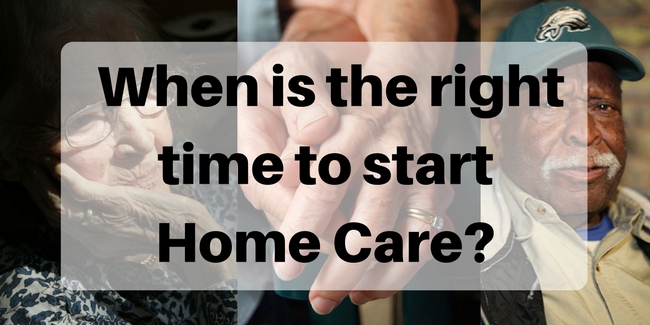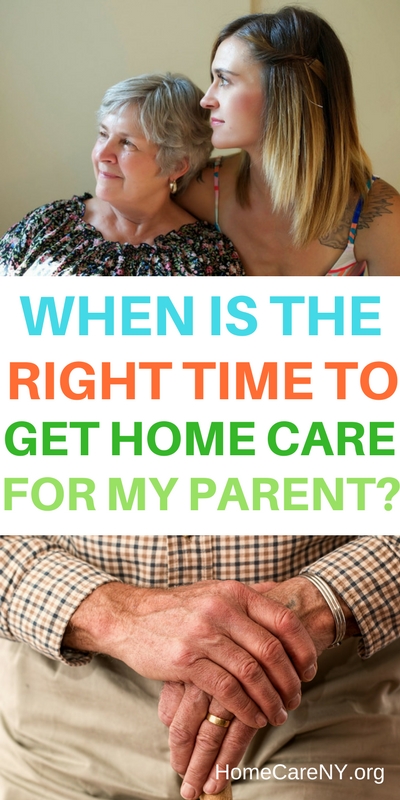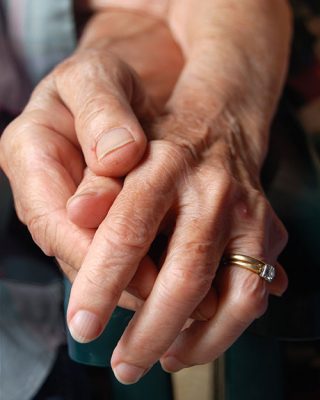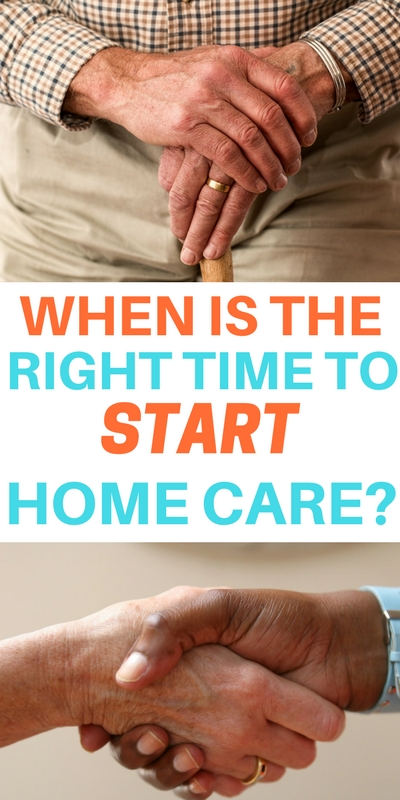Signs That Your Loved One May Need Home Care

Choosing Home Care for you or a family member is an individualized decision, and it’s often challenging to pin point the “right time” or “perfect time” to begin Home Care. In fact, we would argue that there is no perfect time to start Home Care; rather, it’s whenever you feel it’s the right time to start.
 It takes a keen eye, some compassion and just plain old communication to know when your loved one may need a little extra support. Everyone wants to lead a healthy and productive life and remain independent at home or in their community. However, as individuals inch a little older or a chronic illness like Alzheimer’s disease takes its toll on the mind and body, the smaller things in life can become insurmountable challenges.
It takes a keen eye, some compassion and just plain old communication to know when your loved one may need a little extra support. Everyone wants to lead a healthy and productive life and remain independent at home or in their community. However, as individuals inch a little older or a chronic illness like Alzheimer’s disease takes its toll on the mind and body, the smaller things in life can become insurmountable challenges.
Clients with Alzheimer’s, for example, whom for years have led successful careers, raised their children and protected their families, could suddenly forget to brush their teeth, take their medications or meet their longtime friend at the local diner for their Tuesday luncheon as they have more than 20 years. In a silo, these events may not amount to much, but when the forgetfulness becomes repetitive, it could be a sign of something going on with your loved one.
Aging is a process that we all look to do gracefully and with dignity. There is nothing better than to know that a loved one would be there to help in case any medical or social needs arise. However, with aging, we never know what challenges may arise. The three steps in the front of the home become a summit, getting in and out of the bathtub requires a bit of support and not forgetting that the homemade chicken soup for Thursday night’s dinner visit with the grandchildren is on the stove are all now things an individual must think about more than the usual.
 This article discusses the signs that it may be time to start utilizing Home Care and what the benefits for the individual and family. Throughout this article, you can listen to audio clips of Lucia Pons, the owner of LWS Home Care in NY, and hear her passion and compassion for the clients she serves. Remember that there is a range of Home Care options from just a few hours a day (or week) to full 24-hour service, depending upon the client’s needs. All programs are individualized, so you can ease into using Home Care if that is your preference.
This article discusses the signs that it may be time to start utilizing Home Care and what the benefits for the individual and family. Throughout this article, you can listen to audio clips of Lucia Pons, the owner of LWS Home Care in NY, and hear her passion and compassion for the clients she serves. Remember that there is a range of Home Care options from just a few hours a day (or week) to full 24-hour service, depending upon the client’s needs. All programs are individualized, so you can ease into using Home Care if that is your preference.
Guidelines for when you may consider starting Home Care:
As a general guideline, these 2 basic principles indicate a potential need for Home Care:
- When the individual starts to feel overwhelmed and needs some support.
- When the adult child care giver feels overwhelmed. This is NORMAL. They may have other responsibilities to tend to including their own family, career, etc. Or they may live somewhere else. It can become a daunting task to juggle your family, your own personal needs and career life along with an aging parent or someone with a chronic illness. And, this makes it hard for everyone involved.
 That’s where Home Care becomes an asset. We become your partner. We give people the flexibility to remain in their home but also to participate in their life story in order and have a healthy and stable environment.
That’s where Home Care becomes an asset. We become your partner. We give people the flexibility to remain in their home but also to participate in their life story in order and have a healthy and stable environment.
And, it’s a comfort for the family allowing more flexibility and less stress. We enable the children to go to work and come home and know that their parent is well taken care of while they are away.
The key to Home Care is that it’s a partnership
We’re not there to impose on anyone or to tell them what they have to do or to lead a different lifestyle. Rather, we are there to encourage and enhance their chosen lifestyle. And we are there to assure the individual that these small challenges that they’re now faced with can be overcome with some support.
Home Care helps the whole family
 Importantly, Home Care not only helps the person being cared for, but also the whole family. You need to look at it holistically, so that everyone remains intact, and you don’t have a breakdown of the fabric of the family that can be pulled apart at the seams.
Importantly, Home Care not only helps the person being cared for, but also the whole family. You need to look at it holistically, so that everyone remains intact, and you don’t have a breakdown of the fabric of the family that can be pulled apart at the seams.
You may now have a family member who has Alzheimer’s and is forgetful about taking their medicine or doesn’t remember they need to walk the dog or doesn’t remember that they have a doctor’s appointment at 3 pm. Then you have a family member (or even a neighbor) who has to rearrange their life to make all those things happen. So, the more that those seams come undone on one end with the individual, they can just as well come undone on the other end of the fabric, and then all of a sudden you have this avalanche of things happening that could have been prevented before it turned into a crisis.
We set goals with the client
We work closely with the client to understand what things were like before vs how they are now physically or mentally. What are the differences and what is it they want to maintain the most? This priority is what’s going to drive the bond with the Home Care company. The bond between that client wanting to get Home Care and the bond between the primary care giver (i.e. the family member or neighbor) wanting to have this outside partner come in and provide support.
Home Care has to be addressed based on where the priorities are and where the client sees themselves within those challenges, and then we turn this into a positive with goal planning. This will differ for each individual. What will make your health care and life more meaningful? Is it to be able to walk up the stairs? Is it being able to get into the bathtub? Is it making sure you take your medications every day so your diabetes doesn’t spiral out of control? Is it having someone help you with meals so that you can sit down when you’re tired and won’t forget to turn off the stove?
Having a care giver is an investment against future incidents
 Prevention is the key. The biggest issue is falls. Falls are the #1 injury in the US and #1 among seniors. This can often happen during every day occurrences in the home such as tripping over rugs or wires, especially as some seniors may drag their feet and not step as high as they used to. This of course can lead to a fracture, including a broken hip or leg.
Prevention is the key. The biggest issue is falls. Falls are the #1 injury in the US and #1 among seniors. This can often happen during every day occurrences in the home such as tripping over rugs or wires, especially as some seniors may drag their feet and not step as high as they used to. This of course can lead to a fracture, including a broken hip or leg.
And, then you have the long-term implications of a fall and not having proper ambulatory mechanics can have both a physical impact and long term financial impact, especially if a hip replacement is needed.
Having a care giver is an investment against future incidents. Prevention is the key to everything and it’s priceless.
We all age differently and in different environments. Different parts of our bodies and our mental state take a hit from the aging process. The same thing happens with a chronic illness. Every illness impacts every individual differently.
So, when you have a Home Care team and take a holistic approach, we look at how we can prevent problems and make every day activities easier and less stressful.
 Some people forget that instead of putting out a fire, it’s better to alert the fire department and put them on alert that there may be a fire as well as take steps to prevent the fire.
Some people forget that instead of putting out a fire, it’s better to alert the fire department and put them on alert that there may be a fire as well as take steps to prevent the fire.
The Home Care team will look at the totality of the environment. Not only are we working with the family, but also in conjunction with the medical experts that are involved in that individual’s life in order to make sure we can slow down where that illness has been going. And, we provide the most adequate and best health education that we can so that they have the best options and tools in order to manage their life in a much more robust manner.
Home Care supplements the care that the family is already providing
We are not a substitute, but rather an augmentation to the care the family is already providing. We free up time and reduce stress. This allows the other family members to spend more time at work or taking care of their kids or going grocery shopping.
 For example, maybe the client has Alzheimer’s and the home health aide plays games with them that will help in their treatment. Stimulation is key, especially for illnesses that affect the brain such as Alzheimer’s, Dementia and MS. Stimulating the brain is like food or nutrients. Engaging with an individual so they feel that they are part of society and they have someone there who’s caring and compassionate and engaging with them and who they can have a conversation with, while at the same time encouraging them to have a more active lifestyle that can help them improve their health. What more empowerment can you have than that?
For example, maybe the client has Alzheimer’s and the home health aide plays games with them that will help in their treatment. Stimulation is key, especially for illnesses that affect the brain such as Alzheimer’s, Dementia and MS. Stimulating the brain is like food or nutrients. Engaging with an individual so they feel that they are part of society and they have someone there who’s caring and compassionate and engaging with them and who they can have a conversation with, while at the same time encouraging them to have a more active lifestyle that can help them improve their health. What more empowerment can you have than that?
Most people don’t realize that the body is really a mechanical engineering piece of equipment and no matter which part of the body it is, you’ve got to continually provide some kind of nutrients so it continues to grow and won’t slow down and doesn’t need to much reparation. So, I think part of the home health team, not just the aid that goes in there every day to ensure that those activities of daily living are adhered to, but can also provide some one-on-one stimulation and compassion can really foster a lot of growth and a good healthy lifestyle.
Influencing positive choices
 The Home Care team is there to influence choices throughout the day, whether it’s engaging them in conversation, helping them make nutritious choices, encouraging physical activity – all those small decisions throughout the day.
The Home Care team is there to influence choices throughout the day, whether it’s engaging them in conversation, helping them make nutritious choices, encouraging physical activity – all those small decisions throughout the day.
So sometimes the home health aide will be the stimulus or the catalyst to encourage the individual to go to the food market and go shopping. The aide may suggest that they go to the local market to get fresh fruits and veggies. These are the little things that can make a big difference because now they have a companion.
Maybe someone doesn’t have that during the day (while their family is at work/school). Maybe they’re just waiting for them to get home from work for them to prepare a meal, and as you know we’re all living lives where we are busy and rushed. We get out of our jobs at whatever hour, we get home late and we’re doing quick meals. And, maybe if your parent is diabetic, rice and fried chicken is not the nutrition you wanted to offer, and maybe your parent wanted to go out to the local market and get vegetables and fish and cook it, but didn’t because they were afraid of falling or they’re not sure what the best food is, or maybe they just forget they had to make a meal.
 So, the home health aide can provide that encouragement and that stimulation and that information and that support to get that person out of the house. Or maybe they have a problem walking or they have arthritis or maybe they are afraid that if they go out on their own they will get tired and wonder who will take them home then. So that aide can provide that assistance.
So, the home health aide can provide that encouragement and that stimulation and that information and that support to get that person out of the house. Or maybe they have a problem walking or they have arthritis or maybe they are afraid that if they go out on their own they will get tired and wonder who will take them home then. So that aide can provide that assistance.
Just knowing that someone will be there is comforting. And, it’s also a lot more comforting for the adult child who can say, “I know my mom is taken care of while I’m at work because the aide is there, and I know she’s going to make the wise decision to get healthy food vs having a quick fix (e.g. the parent saying that they didn’t want to go outside to the market so I just popped open a can of Spaghetteos).
This is a win-win situation because it’s putting people at ease and providing the health care safety net to be able to get these things accomplished. It makes things easier and more comfortable for both the individual and their family members.
So, when you’re asking if it’s time for Home Care, it’s not just when do you have the need for Home Care, but also when could it make your lives better?
 Having a need for Home Care and leveraging it to make your lives better are almost synonymous. And yet there is also a dichotomy because you can have the need, but you may feel staying in the status quo is okay. But, when people start to feel they aren’t contributing to their own lives, much less to whatever environment they’re living in, that’s when people start to feel depreciated. That’s when people start to wonder what’s their life’s value. Depression can set in and people tend to retreat and they don’t tend to go back to how things were before and then things can continue downhill.
Having a need for Home Care and leveraging it to make your lives better are almost synonymous. And yet there is also a dichotomy because you can have the need, but you may feel staying in the status quo is okay. But, when people start to feel they aren’t contributing to their own lives, much less to whatever environment they’re living in, that’s when people start to feel depreciated. That’s when people start to wonder what’s their life’s value. Depression can set in and people tend to retreat and they don’t tend to go back to how things were before and then things can continue downhill.
Choosing when it’s time to start Home Care can be a very difficult decision for the family members who are involved in the decision-making process. You know that your parents have given you everything in all the years they provided their support and you want to be able to do the same. And, you want to be able to do same without feeling stress and the feeling of being overwhelmed about doing this on a day to day basis.
Sometimes, you need to step outside of the picture so you can get a breath of fresh air and look at things from a different perspective. And, that’s really what making Home Care choices is all about. It’s being able to look at things through a different lens and know when and what options you have as well as when you are able to access them.
Sometimes the roles are reversed when dealing with senior parents because they are no longer the primary caregiver. And, now it’s the adult kid who has become the primary caregiver. And, for parents, it almost feels like they lost their independence. We don’t want them feel that way. We want them to feel independent and be on their own. But, we also want them to understand that we love them and want to make these decisions where they are not compromising their own safety.
To further complicate matters, the person receiving the care doesn’t want to be burdensome either and have their relatives caring for them or hyper-extending themselves. They are often also concerned about the financial burden of care and balancing both of these. (More about that in a bit.)
What’s key is that for those individuals who are self-aware, it’s really how they feel comfortable and what they foresee their life moving forward to be. It’s going back to what your goals are. And, for those who are not self-aware, where they have other people that are providing that support and maintenance for them, how much more are you willing to take on to make sure that they are safe at home.
There are different ways and perspectives on this and how to get Home Care. We are not prescribing what’s right for you and your family. All we can do is provide guidance and support to better enable you to make smart decisions.
Signs it may be time to consider starting Home Care for a loved one
- When the individual doesn’t feel safe at home any more
- When the individual socially withdraws from their community and loved ones
- When the individual demonstrates some mental health issues
- When the individual starts to physically deteriorate
- When the individual doesn’t feel the same as they did a week ago
 It’s often very difficult to pin point. These decisions are individualized. When people start to realize what brought meaning to their life, they’re not able to achieve any longer or they are no longer are able to strive for. Then, they should seriously start to consider Home Care.
It’s often very difficult to pin point. These decisions are individualized. When people start to realize what brought meaning to their life, they’re not able to achieve any longer or they are no longer are able to strive for. Then, they should seriously start to consider Home Care.
Sometimes there are some more obvious or basic signs
- Did the person forget to take their medication?
- Did the person forget to go to a doctor’s appointment?
- Did the person forget to pick up their grandchild at day care?
- Did the person fall on multiple occasions? Or, are there bruise marks on their arm? (This could be an indication that they fell.)
- Is the person having trouble monitoring their glucose levels within a normal range?
- Was the stove left on?
- Did you come home and find your parent isn’t there (or they aren’t back when they’re supposed to be)?
- Are there too many frequent visits to the Emergency Room?
- When the individual feels the home is no longer equipped to reside in. Home Care addresses this, too. We look at the structure of the home and what’s missing. Sometimes, simple modifications are needed such as a bathtub chair or a ramp. Or maybe a chairlift is needed, or perhaps a building with an elevator and no steps is better.
Many of these are light bulb moments, especially as they can impact safety.
Finances seems to be the biggest barrier to starting Home Care…and often it shouldn’t be
To the point of finances, people stress over paying out of pocket, but there are multiple ways to get Home Care, and I think what’s important is to at least reach out to a Home Care company, or a few Home Care companies or your local department of social services to find out what your options are because it doesn’t have to mean that you’re breaking the bank.
How does the Home Care process work?
Once we are engaged with a client over the phone (or in person), we ask a series of questions such as:
- What diagnosis do you have?
- Who’s your primary doctor? What specialists do you work with?
- What medications do you take?
- What’s your routine?
- What insurance do you carry/are you eligible for (we help clients with this)?
- What goals are you trying to meet?
 Once that information is gathered, a nurse will go out and do a medical assessment as well as a history. And he/she will assess the home to see if any medical technologies or improvements are needed to support your goals. The nurse will also gauge what other support you have, how family members may be able to provide some back up (or not) and the hours and schedules needed.
Once that information is gathered, a nurse will go out and do a medical assessment as well as a history. And he/she will assess the home to see if any medical technologies or improvements are needed to support your goals. The nurse will also gauge what other support you have, how family members may be able to provide some back up (or not) and the hours and schedules needed.
Then, we’ll review the services that would be beneficial for the individual.
Different tiers of home care are available
 There’s an array of choices for Home Care services. Some may need 24-hour care; some may need care while the adult child is at work, others may only need help with shopping or meals for a few hours a day (or even a few hours a week). All plans are individualized. And, the amount of assistance can be adapted over time.
There’s an array of choices for Home Care services. Some may need 24-hour care; some may need care while the adult child is at work, others may only need help with shopping or meals for a few hours a day (or even a few hours a week). All plans are individualized. And, the amount of assistance can be adapted over time.
We’ve had clients who live on their own but now have vision problems so driving isn’t safe. They may just need help driving to get groceries or going to doctor appointments, or someone to bring them to meet with their friends for lunch or a pinochle game. We’ve also had clients with severe Alzheimer’s who now have sundown (where they sleep during the day and wake up at night). At that point, they are up and about and ready to go out and that’s not safe, so they may have a live-in person to watch over them. Or someone to be there while their spouse is out.
 It all varies. We customize the plan for the individual’s needs and their family. There is no “one size fits all.”
It all varies. We customize the plan for the individual’s needs and their family. There is no “one size fits all.”
There is the nursing respect as well, where the nurse will do pre-pours to make sure there are no medication errors, or that there haven’t been any changes at their most recent doctor appointment. With the pre-pours, the nurse places the pills in boxes for the client and this could be done on a weekly, monthly or sometimes quarterly basis. The home care aide can also assist with physical therapy. It’s all based on the needs of the client.
If someone has challenges ambulating due to arthritis or if they had a fall and are now recuperating, the physical therapist can provide some exercise regimens or info to both the client and the home care aide so that the aide can assist the client in between visits. So, it’s very much of an interdisciplinary approach and holistic because that aide can only do what the client and their family want, but also encourage what the medical community is trying to get the client to achieve as well.
Conclusion
 We all want to have the freedom to make sound decisions about our health and bodies. Sometimes, there comes a time when those decisions are not enough for an individual to remain in the comforts of their own home alone. Even with family caregivers or the support of adult children, this can be daunting and consuming.
We all want to have the freedom to make sound decisions about our health and bodies. Sometimes, there comes a time when those decisions are not enough for an individual to remain in the comforts of their own home alone. Even with family caregivers or the support of adult children, this can be daunting and consuming.
Home Care provides the social and medical safety net that enables and enhances the ability of a senior or an individual faced with chronic illness challenges to remain empowered and live at home. Through coaching and subtle prompts, a Home Care team can provide the day-to-day support to ensure that life still is meaningful.
Home care is the extension of what the primary caregivers and their affected family member needs. This gives the family more time to focus on the more enjoyable activities such as a granddaughter’s smile at dinner while having chicken soup, or telling their girlfriend from 20 years at the local diner about how the dog brought their leash for a late afternoon walk. These meaningful and priceless moments are what we all strive for, and we want our family members to spend more time on these moments and reduce the stress faced with the day-to-day challenges.
If you’d like to continue the conversation on Home Care, feel free to give us a call at 212-307-7107. Or email us at intake@homecareny.org, and we’d be happy to reach out to you. We have multiple locations and service NYC (all 5 boroughs), Westchester, Rockland, Orange and Dutchess Counties.
Map for LWS Household Services – Areas we serve
New York City, Westchester County, Rockland County, Orange County, Dutchess County
When is the right time to get Home Care?
Leave a Reply